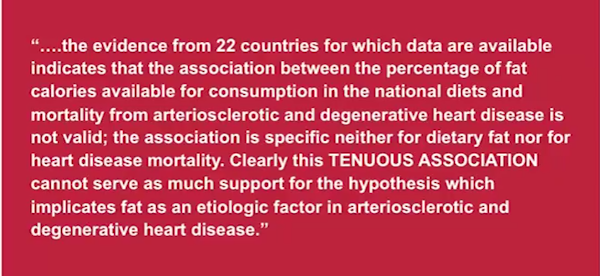The Diet - Cholesterol - Heart Hypothesis
The following is my commentary, a reconstruction, written from my own notes, and may not be entirely as accurate as I (or Dr Noakes) would like.
Video eleven, thirteen and fourteen
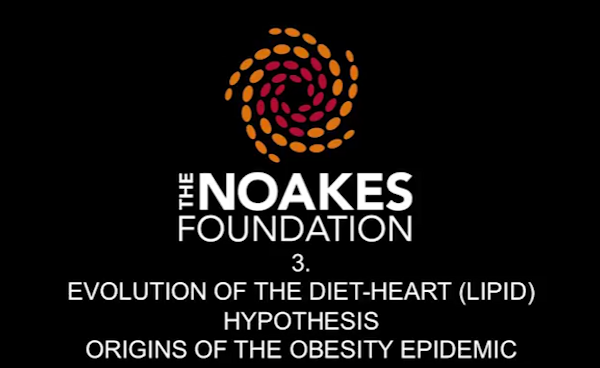 |
| Click to enlarge |
|---|
There are two theories about the cause of heart disease. Today I believe they are both wrong, but support for these ideas remains common.
The Diet Heart Hypothesis: This is a old idea often attributed to Ancel Keys. In 1953 Keys made the assertion that saturated fats caused heart disease and produced "evidence" to support his case in the form of The 6 Country Study. The hypothesis says that what you eat, especially saturated fat, clogs your arteries and causes heart disease. The idea is easy to understand and was widely supported without any scientific effort to see if it's a valid concept.
The Lipid Hypothesis:
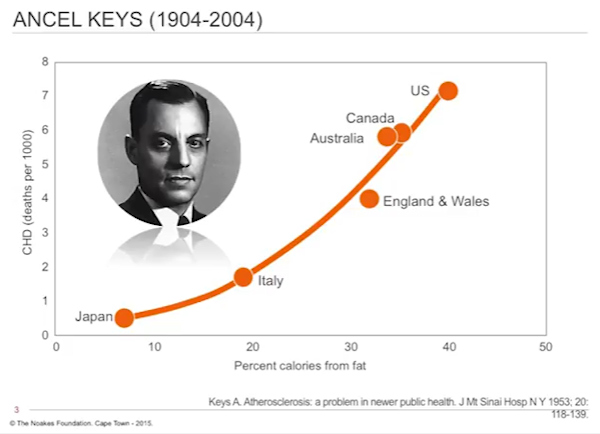 |
| Click to enlarge |
|---|
This is a separate by related idea, and they are often confused. The idea is that a lipid called cholesterol causes heart disease. This theory came about because in the examination of heart attack victims blood vessels, under an electron microscope, it's easy to see that there is a lot of cholesterol present. Once again this idea was widely accepted. More-so because it was argued that dietary saturated fats would increase blood cholesterol.
And there were paradoxes:
Finland and Israel - have low fat diets and very high heart attack rates.
Sweden, Norway and France - have high fat diets and a low incidence of heart disease.
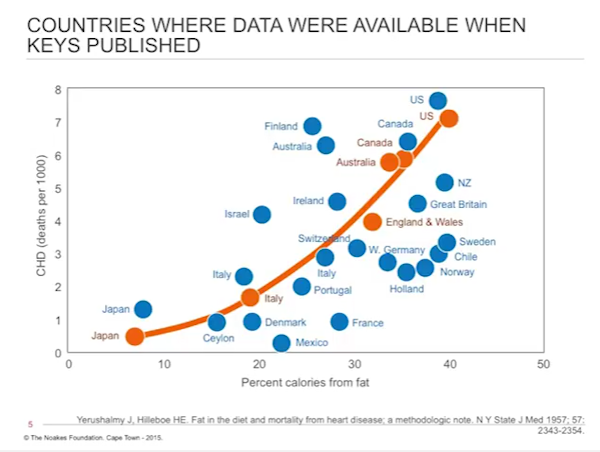 |
| Click to enlarge |
|---|
20 years later it was revealed that there were 22 countries that Keys had data for, and if you included them all, the relationship between dietary fat and heart disease vanished. Using the same data John Yudkin found a better relationship with sugar consumption.
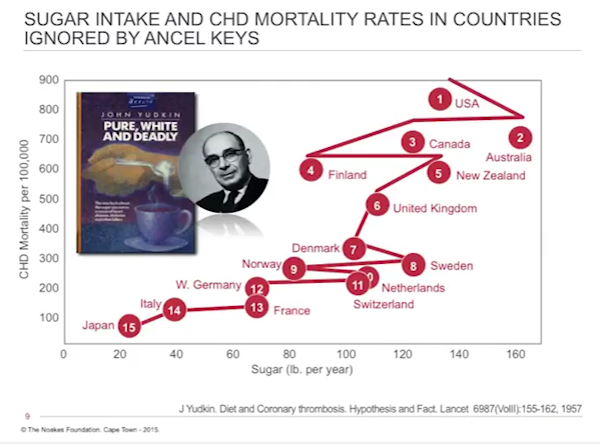 |
| Click to enlarge |
|---|
Yudkin was strongly attacked by the sugar industry and his university and professional colleagues abandoned him. This is the power of industry to control the agenda. There's no doubt now that Yudkin was right, but his work was avoided, it became "information we choose not to know."
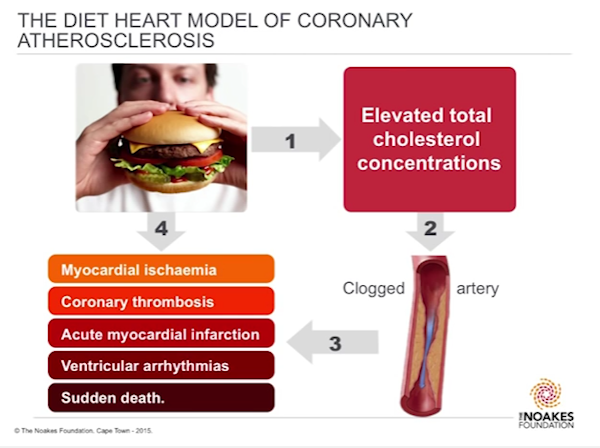 |
| Dr Noakes believes that this model is wrong Click to enlarge |
|---|
There are five typical types of heart attack.
Sudden death, which is unusual
Myocardial Ischaemia - caused by reduced blood flow and lack of oxygen
Coronary Thrombosis - caused by obstructed blood flow usually from atherosclerosis breakdown
Acute Myocardial Infarction - sudden deprivation of circulating blood damaging heart muscle tissue
and Ventricular Arryhythmias - abnormal rapid heart rhythms starting in the lower chambers of the heart.
Are they all "caused" be the same thing? Your diet, lack of exercise, or high blood cholesterol? Something else?
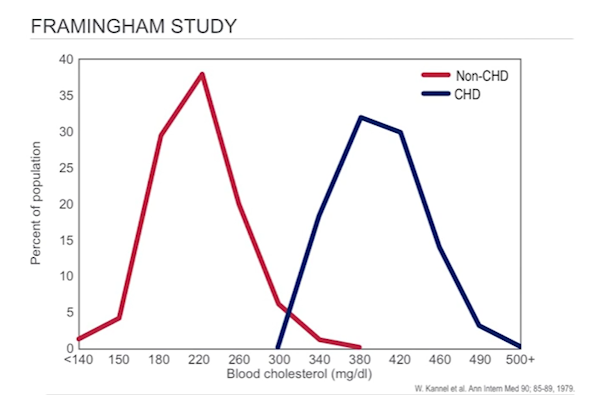 |
| A prediction of future Heart disease? Click to enlarge |
|---|
There have been many attempts to explore these issues, particularly important is the long running Framingham Heart Study. They began with 5000 participants, in families, and initially they showed that both high cholesterol and high blood pressure were related to cardiovascular disease. They are now working with the third generation of these families.
At first it seemed that total cholesterol would be an excellent predictor of future heart disease. In the diagram there is almost no overlap between those likely to have heart attacks and those who seem to be protected.
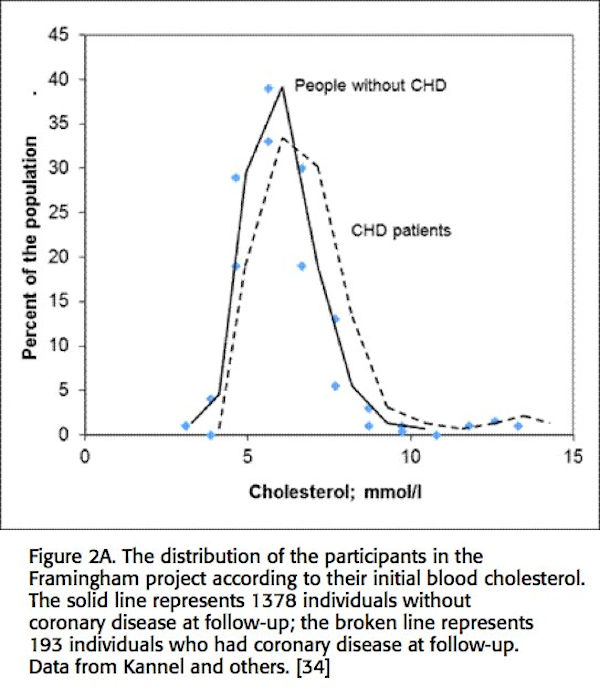 |
| Click to enlarge |
|---|
But 30 years later one of the study leaders William Costelli reported: "Most of what we know about the effects of diet factors, particularly the saturation of fat and cholesterol, on blood lipid parameters derives from ward type studies. Alas such findings ... have been disappointing. Indeed the findings have been contradictory."
"For instance in the Framingham Study; the more saturated fat people ate, the more cholesterol they ate, and the more calories they ate, the lower was their serum (blood) cholesterol."
"We discovered that by themselves total cholesterol levels were useless for predicting the risk of heart disease."
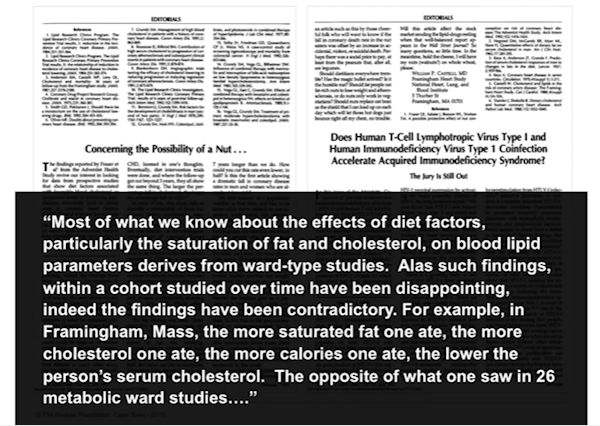 |
| Click to enlarge |
|---|
"After the age of 50 there is no increased mortality with either high or low serum cholesterol." ... "Between 51 and 65 there is an association between falling cholesterol and the risk of mortality in the next 18 years." .. "But beyond 65 higher cholesterol seem to be protective, reducing both the rate of heart diseases and the rate of cancer."
So he's telling us they have a lot of data about cholesterol and it makes no sense. So the obvious thing is that there is no relationship between cholesterol and heart disease at all. (Maybe a long false trail.)
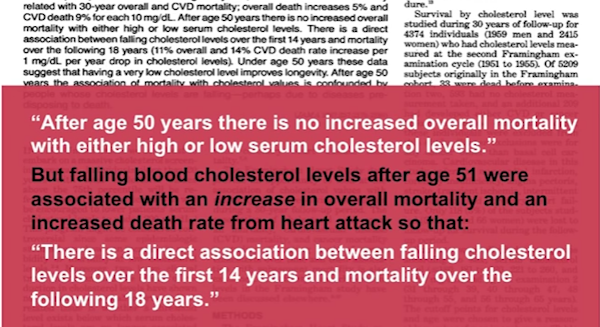 |
| Click to enlarge |
|---|
Cholesterol is a lipid - a fat - and it's not water soluble so in the blood it's contained in a lipo-protein. We should not speak of the two types of cholesterol, HDL-C and LDL-C as good and bad cholesterol. We think HDL-C is protective and LDL-C is probably harmless. It's possible that small dense particles in LDL-C are damaging, we can't be sure.
Norway has a very healthy population. Norwegian data shows no relationship between cholesterol and cardiovascular disease.
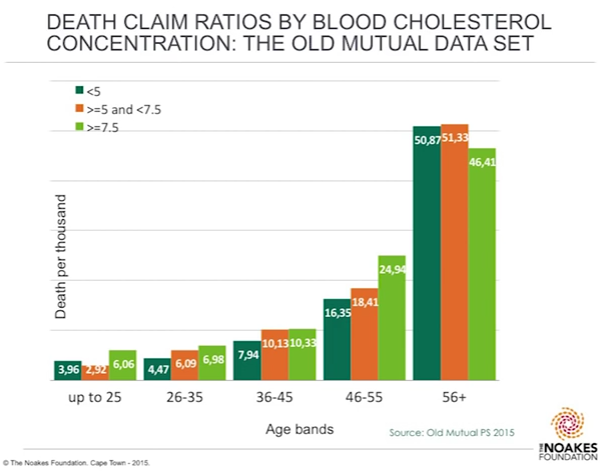 |
| Click to enlarge |
|---|
South African insurance companies have good reasons for keeping their own data on heart attack risk. They did a study of 165,000 people, and their data also shows no relationship to cholesterol. If you just look at the statistics for the 46-55 group there appears to be a relationship indication that higher cholesterol is a risk factor, but in the 56+ group that apparent trend is gone. Cholesterol is meaningless as a risk factor.
There are three significant risk factors for heart disease; diabetes, age and smoking. Blood pressure comes in a poor fourth.
Diabetes is a generalised vascular disease caused by damaged glucose metabolism. The problem is excess insulin in the blood stream for long periods, causing inflammation. Insulin resistance develops, but it's hard to test for that. I believe the Framingham study points to two reliable indicators of insulin resistance, low HDL-C and high triglyceride's. High fat diets produce high HDL-C and low triglyceride's, and that's desirable.
Ongoing Controversy
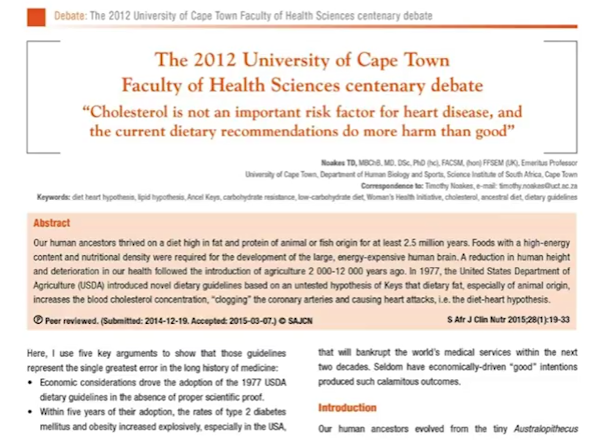 |
| Click to enlarge |
|---|
The title for this 2012 debate at the University of Cape Town, is That Cholesterol is not an important risk factor for heart disease, and the current dietary recommendations do more harm than good. This is the university trying to get important public health messages into the public mind. It's been known for 20 years that cholesterol is not an important risk factor for heart disease, although some question mark remains over small dense particles in LDL cholesterol. People should know that. People only need to look at the statistics for obesity and diabetes, to understand that there is a problem with the dietary recommendations too. Public interest is to ask, "In what way are those recommendations misleading?"

